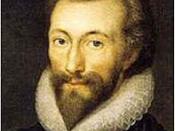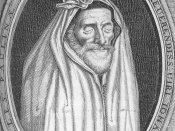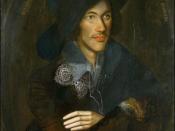Born into the Christian religion of Catholicism, John Donne converted to Anglicanism in midlife and as a result; it is unsurprising to find that a large amount of his poetry is devoted to religion and his relationship with god. However, upon examination of his works, we can discern that his relationship with God is intertwined with his relationships, both real and desired, with sex . To begin to examine Donne's works, we must first unpack his label as a 'metaphysical poet'�. The term 'metaphysical', with regards to poetry, is defined in the Collins English Dictionary as 'poets who combined intense feeling with ingenious thought and often used elaborate imagery and conceits'. This definition describes Donne's work perfectly, as not only did he utilise 'ingenious thought' or wit in his writings, but also includes extended metaphors and imagery to convey the message. In examining the form or themes in Donne's writing, we will consider three of his poems or sonnets, The Flea, Holy Sonnet VII and Holy Sonnet XIV and shall also consider the conceit that Donne regularly includes in his work.
In Donne's Poem The Flea, the speaker is attempting to justify to a woman why she should acquiesce to sexual intercourse with him. The flea, which has sucked on the blood of both parties, has within it "two bloods mingled"� and in this we can read that as the flea has sucked and mingled the blood of the pair that this would be enough to justify themselves mixing their body fluids by having sexual intercourse. In comparing the speaker's carnal desire to the actions of the flea, we are shown a typical example of Donne's wit as Dwight Cathcart comments "...of course Donne had...seen the intrinsic wit of using a flea, like fornication, to justify acts which...


